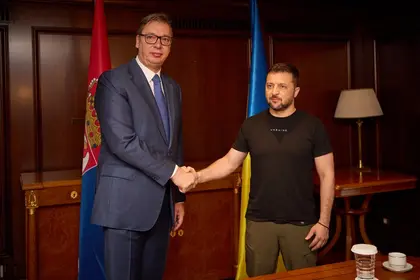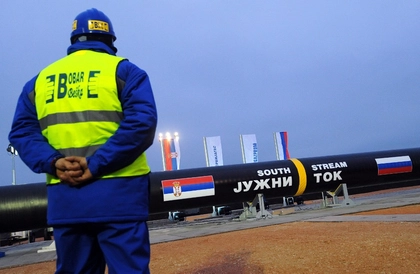Sergey Lavrov, Russia’s foreign minister, recently issued threatening messages during a press conference, warning Serbia and its president, Aleksandar Vučić, of “painful consequences” if Belgrade decided to impose sanctions on Russia or take any action deemed hostile by Moscow. The immediate trigger for these threats was the fate of the Petroleum Industry of Serbia (NIS), majority-owned by Gazprom and Gazprom Neft, which has been recently sanctioned by the US. Serbia now faces a pivotal choice—yield to Russian pressure and threats or prioritize the interests of its citizens and chart its own path.
At the beginning of the Russian aggression against Ukraine, President Vučić declared that Serbia would not impose sanctions against Russia, pointing out that 85% of Serbian citizens support and have affection for the country. He also stated that this attitude could change if the non-imposition of sanctions began to directly threaten Serbia’s economic stability.
JOIN US ON TELEGRAM
Follow our coverage of the war on the @Kyivpost_official.
But is this policy sustainable for the largest country in the Western Balkans, now that Russia has been ostracized by all of Europe and the West—by civilization itself? Given the major challenges posed by the sanctions against Serbia’s oil industry, the answer is clear: no. The only discussion worth having is about when, not if, Serbia will make a significant change.
Vučić’s claim about the high percentage of pro-Russian sentiment among Serbs may well be true. However, such feelings cannot and must not serve as a parameter for a leader who makes decisions for the nation. It is the duty of a statesman to put the emotions of the majority—be they real or not—aside and make decisions based on reason and facts. In the case of NIS, the situation is crystal clear. The US has imposed sanctions on the company due to its Russian ownership, and the UK has joined these sanctions, with the EU likely to follow suit. Serbia has no choice but to suspend ownership of Gazprom and Gazprom Neft and take full control and management of NIS.

US, Armenia Sign Strategic Partnership Agreement
Lavrov’s statements underline Moscow’s long-standing attitude toward Serbia—a policy that treats Belgrade not as a sovereign partner but as a submissive vassal. Serbia finds itself in an untenable situation where the only solution seems to be the nationalization of NIS to ensure the continued operation of the refinery and the supply of the domestic market. While such a move would undoubtedly be in line with Serbia’s national interests, the Russian leadership would see it as a betrayal and is already threatening retaliation. The time has come for Serbia to put its citizens before Moscow and make the recovery of NIS the first step toward independence.
Hard Realities That Override Sentiment
Contrary to the sentiment described earlier, there are undeniable rational reasons why Serbia’s decisions must go in the opposite direction. There is growing impatience among Western partners for Serbia due to its reluctance to join the largest European response to Moscow’s state violence and crimes since World War II.
Everyday life, not just for the 85% Vučić mentions but for all 100% of Serbia’s citizens, is deeply intertwined with Europe, not Russia. Serbia conducts nearly two-thirds (61%) of its trade with EU economies, while barely 5% of its trade is with Russia. Of all foreign investments in Serbia—the largest in the region—almost 70% comes from the EU, compared to less than 10% from Russia. Western investors, alongside domestic companies, are the largest employers in Serbia, providing hundreds of thousands of jobs.
What will Serbia’s economy lose when (not if) it imposes economic sanctions on Russia? Less than $1 billion in exports, primarily food and industrial products (of course, before Russian aggression against Ukraine). This is smaller than Serbia’s annual exports to neighboring Bosnia and Herzegovina ($1.35 billion) or nearly equal to its exports to Kosovo, which it does not even officially recognize as a state.
A Parallel to 1948
As Serbia contemplates a shift in its policy toward Russia, the situation recalls the pivotal year of 1948, when Yugoslavia’s leader, Josip Broz Tito, severed ties with Stalin and the Soviet Union. For the leader of communist Yugoslavia, this decision was incomparably more challenging than it would be for Vučić today. At the time, hundreds of thousands of Soviet troops and their allies were stationed along Yugoslavia’s borders with Hungary, Romania, and Bulgaria, poised for invasion. Inside the country, pro-Stalin sentiment was such that thousands of Yugoslav Stalinists were ready to support an invasion, even at the cost of their own imprisonment. Many Yugoslav generals and security servicemen saw Moscow and Stalin as their chiefs, not Belgrade and Tito. They were ready to die for the USSR and Stalin.
In today’s Serbia, such threats are nonexistent. Furthermore, Serbia is surrounded by NATO members, meaning that despite warm feelings for Russia, no one in Serbia is willing to risk imprisonment, let alone their life, for Vladimir Putin. Tito’s decision was fraught with unparalleled risks—not only for the nation but for himself personally. Stalin attempted to assassinate him repeatedly, with some accounts claiming as many as 22 attempts. This was a showdown with the then USSR, which was incomparably stronger than today’s Russia; the risk was incomparable with the small consequences that today’s Serbia could have, but the decision was made nonetheless.
Russia’s History of Sanctions Against Serbia
For years, Russia has been acting destructively toward Serbia, treating it as its province and believing that everything is permissible. The Russian intelligence services are the main exponents of that aggressive attitude, not only toward Serbia but also toward the entire Western Balkans.
When we finally reach the “umbilical cord” between Serbia and Russia, which is the alliance over Kosovo, we should state calmly that Putin’s attack on Ukraine on Feb. 24, 2022, severed this connection. Russia, previously isolated in the most significant international forums, now faces rejection from the global community. Its support is no longer necessary or achievable. Moscow will persist in asserting its protection of Serbia and Kosovo as its part, both within the UN and other significant organizations, but this assertion comes from a helpless and isolated bully, whose voice in international relations holds no weight. Russia’s isolation in the Security Council, the transfer of crucial decisions to the General Assembly, expulsion from the Council of Europe and the UN Human Rights Council, potential suspension from the OSCE and even the UN Security Council, and numerous international forums prove that Serbia doesn’t require such a Russia. Moreover, it must distance itself from Russia at the moment and turn to its own interests.
Although Russian supporters in Serbia will often say that Moscow has never imposed sanctions on Serbia, this is simply not true. Out of about 150 resolutions that the Security Council passed in the early 1990s in connection with the dissolution of Yugoslavia, a dozen provided for punishments and sanctions for the then FR Yugoslavia, i.e., Serbia, and there was no Russian veto in any of them. The Security Council imposed an arms export ban on Sept. 25, 1991 (Security Council Resolution 713), followed by an economic blockade on Serbia and Montenegro on May 30, 1992 (Security Council Resolution 757), culminating in their expulsion from the UN.
Russia continued this attitude toward Serbia even before the 1999 bombing. Peace Resolution 1244, which ended the bombing of Serbia, was preceded by four resolutions of the UN Security Council, in which Serbia was warned that it was violating the peace (resolutions 1160, 1199, 1203, and 1239), an embargo was introduced on the import of weapons (UN Security Council Resolution 1160), and The Hague Tribunal was asked to collect information about crimes in Kosovo (Security Council Resolution 1199 from September 23, 1998). Russia supported all these measures, as it served its own interests.
Therefore, Russia has often participated in the introduction of sanctions against Serbia, so now, when it needs to reciprocate with a similar measure, Belgrade should not have any regard for Moscow. By joining the EU sanctions, Serbia will respond to Russia in a manner similar to what it has experienced from Moscow on several occasions in recent history.
A Civilizational Question
Today’s Russia, following its brutal invasion of Ukraine, is not an option. Supporting crimes against humanity cannot be an option for any nation or its leadership. Aligning with Putin’s Russia today means being its accomplice. It is not merely a geopolitical choice—it is a civilizational question. Putin’s Russia is behaving like a gang of thugs.
President Vučić has a historic opportunity to secure Serbia’s place among the world’s most advanced nations. He is a leader who wants to leave a legacy, and this moment presents him with that chance. He should not focus on public opinion polls, as a true statesman leads his people, not merely follows them. That’s why they elect him.
He has already made difficult decisions during his 13 years in power, such as cutting wages and pensions to stabilize chaotic public finances early in his tenure. I am confident that 100% of Serbian citizens would oppose this decision if he had consulted them. However, he didn’t consult them; he made that decision knowing that the state would face bankruptcy if he didn’t implement financial consolidation. The decision to distance himself and say “no” to Putin’s war adventures and the atrocities they have caused in Ukraine is far easier than reducing pensions in one’s own country.
A Decision That Must Be Made Quickly
Dante Alighieri once said that “the hottest places in hell are reserved for those who, in times of great moral crisis, maintain their neutrality.” Serbia cannot remain neutral—it would be disastrous. Serbia would not be able to withstand even partial sanctions, let alone complete isolation from Europe and the world, which generations of its citizens remember well after the extremely difficult life they lived.
Serbia needs to make a swift decision, as failure to do so will allow others to make decisions about Serbia. Actually, that decision is not difficult. It is imposed because the choice does not actually exist. Russia is not a choice. The only choice left is Serbia in the European Union; it has been on that path for 20 years already. This underscores the urgency for the EU to expedite the integration of Serbia and the rest of the Balkans, as the Ukrainian crisis has underscored the potential dangers of a slow, indecisive, and confused European Union towards its potential members. If this situation continues, nothing will stop Putin and Russia from shifting their aggression from Ukraine to the Balkans, a region they do not want to be a part of the larger European family. In the Balkans, there won’t be any courageous Ukrainian men and women to oppose the Russian aggressor; I fear that there will be those who will celebrate them as liberators instead.
In order to prevent this, important decisions must be made quickly in Belgrade and Brussels and other European capitals. These decisions will appear difficult, but in reality, there is no dilemma at all. Only the irrational fear and anger of a cornered bully whose strength is transformed into self-destruction. Serbia should not and must not be a partner in that suicidal adventure; there is no reason or justification for that.
The views expressed in this opinion article are the author’s and not necessarily those of Kyiv Post.
You can also highlight the text and press Ctrl + Enter










